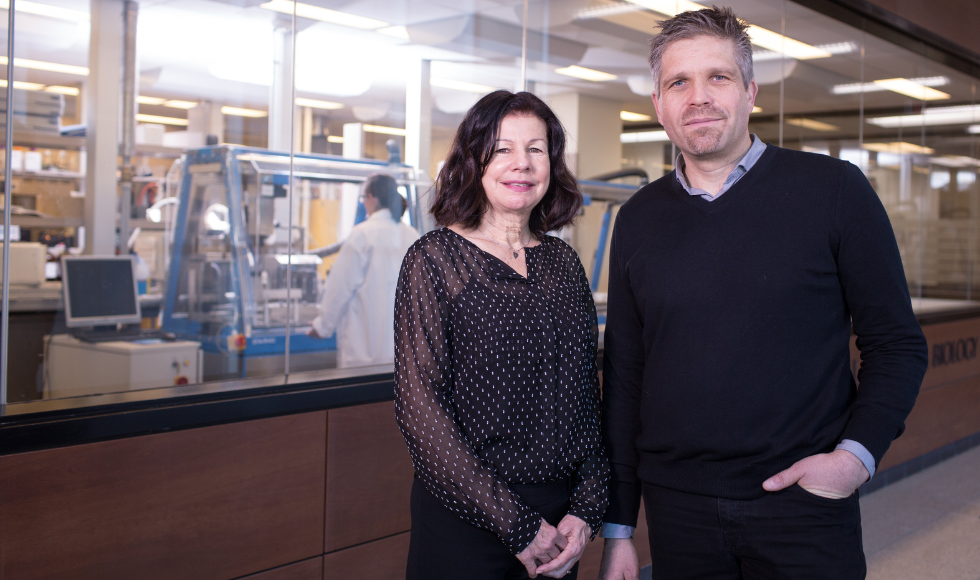Was Pablo Neruda poisoned? New analysis shows covert assassination remains a possibility in Chilean poet-politician’s mysterious death

McMaster researcher Debi Poinar and evolutionary geneticist Hendrik Poinar are part of a group of experts who have presented new information regarding a possible covert assassination of Pablo Neruda to a tribunal investigating the Chilean poet-politicians’s death.
BY Michelle Donovan
February 15, 2023
Evolutionary geneticists and forensic experts who have spent years analyzing the remains of Chilean poet and Nobel laureate Pablo Neruda have added important new information to the case regarding a possible covert assassination.
Over the last two weeks, the scientists, including McMaster researcher Debi Poinar, evolutionary geneticist Hendrik Poinar and other members of the McMaster Ancient DNA laboratory, along with their collaborators in Denmark, have presented their findings to a Chilean tribunal, concluding with a final presentation today to the judge overseeing the hearings.
They have spent years conducting a detailed genetic analysis of bone and tooth samples to look for and reconstruct the genomes of pathogens, specifically Clostridium botulinum (C. botulinum), which may have been responsible for Neruda’s death. The botulism strain produces one of the deadliest toxins known to mankind, botulinum, and is known to have been used as a biological weapon in several countries.
In 2017, scientists from McMaster, working with a forensic team from the University of Copenhagen, determined Neruda did not die from prostate cancer, which had officially been listed as his cause of death. Further analysis suggested C. botulinum was present in a molar extracted for posthumous examination.

At the direction of the tribunal, the researchers have continued to work over the last four years to confirm whether the C. botulinum was present in Neruda’s remains, whether it had been present at the time of his death and if so, was it possible the bacterium had caused his death?
The answer to the first two questions is yes, but they could not conclude if the strain of C.botulinum found in Neruda’s remains killed him, nor that it was intentionally used to do so. However, in 1981, political prisoners in Chile were poisoned with C. botulinum. Should those strains be found, sequenced and compared to the one from Neruda’s molar, it may provide clarity to the last question.
With only recovered fragments of DNA to work with, the researchers used the most advanced techniques and methods available to perform a painstaking reconstruction of a part of the genome of the bacterium, which is soil-dwelling and common in many environments.
Though it was found in small amounts both in Neruda’s remains and at the burial site, they determined the concentration of C. botulinum in the soil surrounding the buried corpse was both extremely low and from different strains than the one present in the molar. In addition the C. botulinum DNA was damaged in a similar way as the DNA of Neruda’s oral bacteria. These distinctions suggest that the bacterium in Neruda’s remains – Type II Clostridium botulinum – had likely been present when he died and was not due to subsequent environmental contamination.
“We’ve employed methods identical to those used to reconstruct the bacterial genome of the Black Death from 700 year old victims,” said Hendrik Poinar, director of the McMaster Ancient DNA Centre and an investigator with the Michael G. DeGroote Institute for Infectious Disease Research.

However, researchers only recovered enough DNA from the molar to reconstruct a partial genome, or one-third of C. botulinum, due to degradation. Further study is required to recover enough additional fragmentary DNA to generate a more complete genome, they say.
Neruda died mysteriously in 1973, days after a bloody coup led by Augusto Pinochet, who remained in power until 1990. Neruda, an influential figure in the ousted regime of Salvador Allende, had been planning to flee to Mexico to lead the anti-Pinochet resistance from exile, but would die in a Santiago hospital.
“The notoriety of Neruda’s suspicious death and the analysis of it is symbolic of the investigation into each unsolved death that occurred during Pinochet’s dictatorship,” says Debi Poinar.
“Perhaps it will be impossible to have a definitive answer as to how the poet died, but so far, the possibility of poisoning by a third party has not been ruled out by the scientific evidence we have found to date,” she says.
In 2016, the Chilean government acknowledged it was “clearly possible and highly probable” Neruda had been murdered.
The judge is expected to decide in the next several weeks whether there is sufficient evidence to prove Neruda had been poisoned by the bacterium or to set up additional panels for continued work on the case.
Timeline of events
1973 – Pablo Neruda died in a Santiago hotel 12 days after Augusto Pinochet seized power in a coup.
2016 – Chilean government acknowledges Neruda may have been murdered. Teams from McMaster University and the University of Copenhagen begin analyzing Neruda’s bones and teeth.
2017 – Researchers determined Neruda did not die from prostate cancer.
2023 – Scientists present findings that Clostridium botulinum was present in Neruda’s remains and it’s possible he was poisoned.


